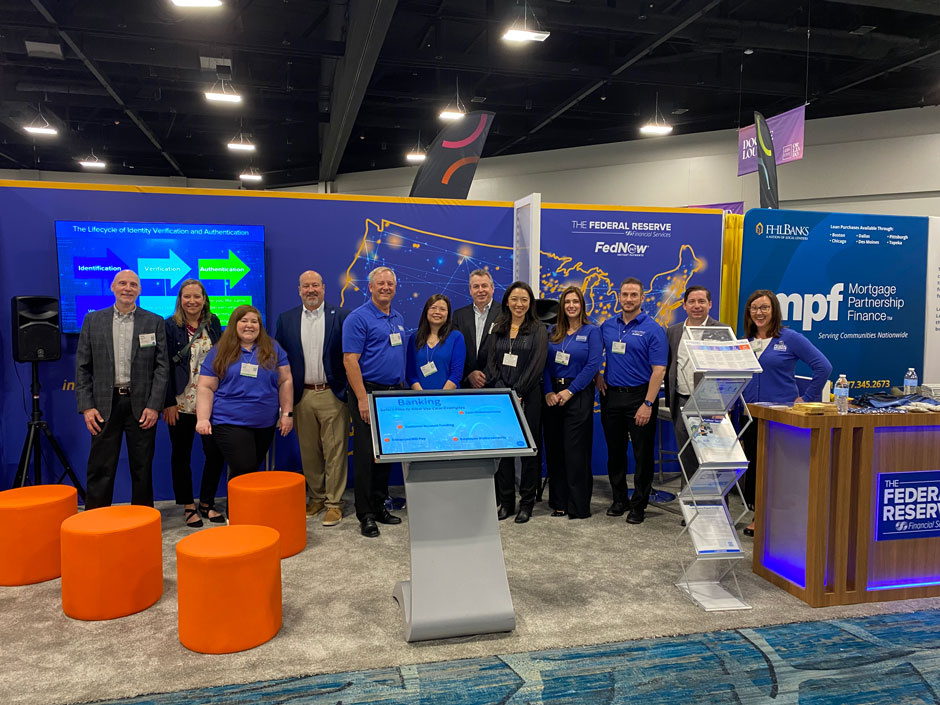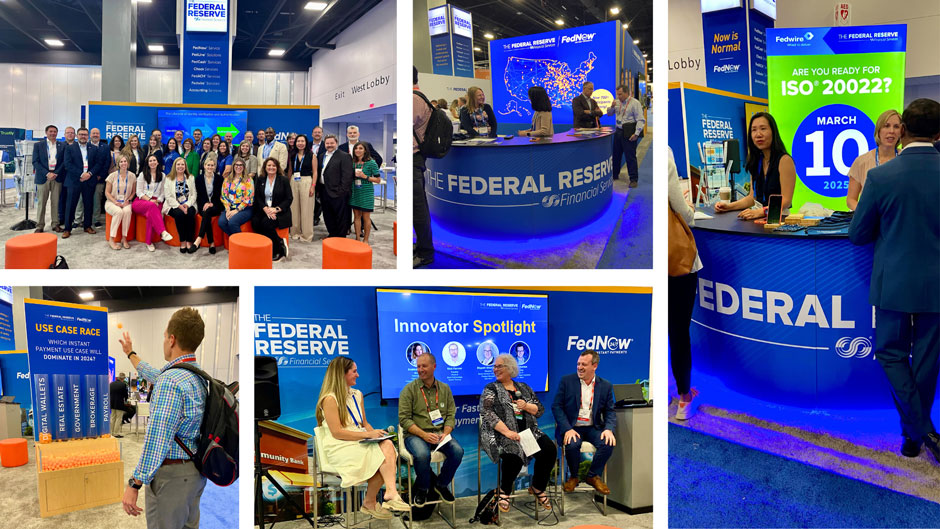Experts from Federal Reserve Financial Services engaged with payments professionals from across the industry during spring conferences. These events provide a valuable opportunity to collaborate on timely topics and trends across the ecosystem, such as the strong momentum of instant payments adoption, fraud and scams mitigation, interbank connectivity through ISO® 20022 industry standards, and more.
See below for highlights and takeaways from conferences and events this spring.
CUNA Governmental Affairs Conference and ICBA LIVE 2024
 In early March, Fed representatives joined thousands of individuals from credit unions across the U.S. for the annual Credit Union National Association (CUNA) Governmental Affairs Conference (GAC) in Washington D.C. Fed attendees enjoyed connecting with the credit union community, including key service providers, on ways to advance payments for all.
In early March, Fed representatives joined thousands of individuals from credit unions across the U.S. for the annual Credit Union National Association (CUNA) Governmental Affairs Conference (GAC) in Washington D.C. Fed attendees enjoyed connecting with the credit union community, including key service providers, on ways to advance payments for all.
The Fed also engaged with community bankers at the Independent Community Bankers of America (ICBA) annual ICBA LIVE event in mid-March. This annual conference provided the opportunity to discuss the latest innovations in payments and FRFS product and service enhancements with community banks.
Nacha Smarter Faster Payments 2024
At Nacha Smarter Faster Payments 2024, the industry heard from 20 Fed experts on a variety of subjects, including the opportunities and evolving use cases for instant payments, fraud mitigation and addressing scams with education, technology and information sharing, interbank connectivity through ISO 20022 standards, business-to-business (B2B) payments innovation and more. A highlight of the event was the Federal Reserve Town Hall session, where a panel of leaders spoke about the Fed’s strategic initiatives and efforts to foster the accessibility, integrity and efficiency of the U.S. payment system. Leaders also showcased the Fed’s ongoing work to support agility in payments, both nationally and globally.
This year, the Fed presented a live “Innovator Spotlight” panel in its Nacha exhibit hall booth that featured three FedNow Service early adopters: Modern Treasury, Jack Henry™ and U.S. Bank. Each early adopter discussed use cases, lessons learned and noted how the adoption of instant payments has impacted the operations of their bank and credit union customers. Panelists also shared emerging technologies they believe will impact instant payments adoption in the future.

Other key takeaways and observations on the state of payments from Nacha include:
- Fraud, and check fraud in particular, continues to be a significant threat. Fed representatives connected with conference attendees on approaches to help financial institutions quickly detect and mitigate potentially fraudulent transactions.
- With demand for instant payments growing, attendees discussed challenges and opportunities, as well as use cases with government disbursements (e.g., disaster relief, child support, unemployment), digital wallet funding and earned wage access.
- Conference attendees also were interested in information about the Board of Governors and Federal Reserve System’s proposal to expand the operating days of the Fedwire® Funds Service and National Settlement Service to include weekends and holidays.
- As global e-commerce grows and evolves, an increasing number of payments, clearing and settlement systems are adopting the new ISO 20022 standard with industry-wide benefits.
- The Fed’s exhibit booth featured an interactive polling activity, where conference attendees voted for the instant payment use case they believe will dominate in 2024. The five options were digital wallets, real estate, government, brokerage and payroll. The most popular use case was digital wallets.
If you were unable to attend Nacha Smarter Faster Payments 2024, the Fed also will be engaged in Nacha’s virtual Remote Connect 2024 (Off-site) June 10-12.
Upcoming Events
The Fed is looking forward to connecting at upcoming conferences later this year. To see a calendar of future events with Fed speakers, visit our Events page.
Note
The Federal Reserve Banks do not sponsor or endorse any of the non-Federal Reserve Bank-related products, parties or entities mentioned in this publication.
